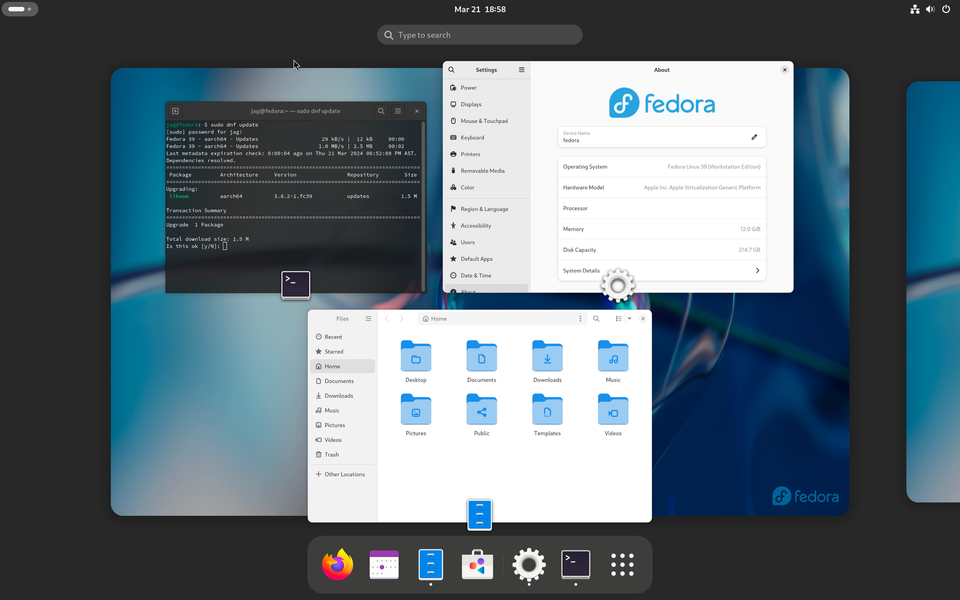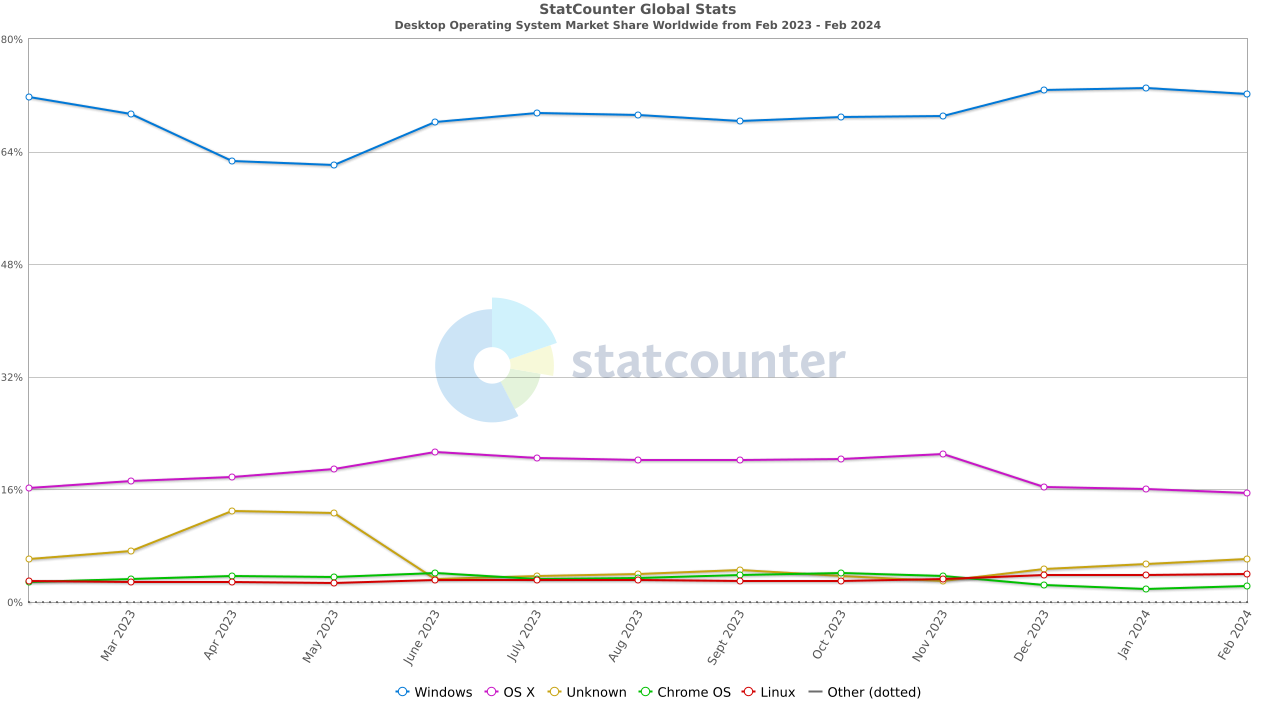Introduction to Linux for Beginners

As someone who has loved using Linux for years in the past. Maybe even more Windows. If there is a computer topic I would love to start introducing new people into, is Linux.
There will be a lot more to cover over time. But for now, let talk about the basics.
What is Linux?
Linux is the third largest Operating System along side Windows and MacOS.
While Linux is not the most popular Destop Operating System, recently reaching 4% of the Market Share Worldwide compared to Windows massive 72% and 15% from MacOS at the time of writing this.
It's still a massive Operating System. Powering all Android mobile devices, most Web Servers and the Internet, devices like the Steam Desk, Meta Quest and more.

It also plays a big part when it comes to IoT (Internet of Things) Devices, Self Driven cars, Robotics, Smart Home devices and more.
Origin
Linux was created between 1990 and 1991 when Linus Torvalds started working on the Linux Kernel while been enrolled in a Unix Course.
He created the Linux Kernel to be somewhat of a Unix Clone but under the GNU GPL license. Which made it a free Open Source alternative to Unix.
Linux Distros
Putting it simple, the same way Windows and MacOS are the complete Operating System for Microsoft and Apple with all the essential software needed and more to start using a Computer.
A Linux Distro is the same thing for Linux.
It's the complete Operating System configured with all the necessary Software needed to start using the Computer. From the Linux Kernel which is the Hearth of a Linux System, to the Desktop Environment of choice, Package Manager and App Store, Drivers, Web Browser, Office Suite and more.
The Main three Linux Dristros been the:
- Debian Based Distros like Ubuntu from Canonical, Pop!OS from System76, Linux Mint, and more.
- Red Hat Based Distros like Fedora, which have slowly become one of my favorites.
- Arch Linux Based Distros like Manjaro.
Debian Based Distros like Ubuntu been the most beginner friendly Distros, and Arch been for more advance users.
But if you're curious don't let Arch's more advance nature discourage you. Distros like Manjaro make it extremely accessible for you to use and learn Arch just like any other Distro.
Linux Advantages and Disadvantages
Just like other Operating Systems, there is a lot of things Linux does better or simply obliterates other Operating Systems while there is a lot of other things that is just not so good at or is simply just not there yet.
I'll discuss some of them now.
Advantages:
Is Open Source
Open Source meaning the Source Code is open to everyone, anyone can contribute to make Linux better. From big Corporations like Canonical, Red Hat, and even Google and Microsoft, to anyone who might take the time to look in to an issue with the community and fix it.
Unlike Closed Source software like Windows, were Microsoft is fully responsible and in control of designing, making, and fixing the software. Only the people responsible of developing the software have access to the Source Code.
Lightweight on resources
Linux runs a lot less things in the background compared to something like Windows. Using much less CPU and RAM resources. Making it perfect for older systems, system with less resources, or for people who just want to use or prefer a lighter system in general.
Depending on what Desktop Environment your using the System might use less than 500MB of RAM when Windows might use a few Gigabytes (GB).
Infinitely Customizable
With Linux you can customize almost anything.
If you install something like Ubuntu which uses Gnome, you can customize the Desktop Environment to your liking using Gnome Shell Extensions. Use Extensions like Dash to Panel to make it more like Windows, or Dash to Dock to make it more like MacOS.
Use a different Terminal instead of Bach, like the Fish Shell or ZSH wich MacOS uses.
You can install a different App Store. If your using Ubuntu you can replace the default Snap Store with the Default Gnome Software store.
Install a different Desktop Environment like KDE and switch between both, KDE and Gnome.
Privacy
Linux's Open Source nature probably makes it the most Privacy Oriented Operating System by default.
Just keep in mind that is in your hands to keep it that way. A Operating System might be completely private by default, but the software you choose install over time might change that.
Either way, Linux is still way more privacy focused than other Operating Systems by nature.
Somewhere in between:
Gaming
Thanks to Steam's Proton and the progress Valve has been making with the Steam Deck, the improvements the Wine Compatibility Layer has been getting over the years, and the improvements and ease of installation GPU Drivers had been getting over the years, Linux has become surprisingly good and amazing when it comes to gaming.
But is not perfect.
Launchers like the Epic Games launcher and others still don't support Linux. And while most single player games probably run and work great on Linux, multiplayer games in the majority don't do to anti-cheat software.
Security
Linux in general is an extremely secure Operating System. and is not as targeted as massively bigger Operating Systems like Windows.
But that doesn't mean someone could install something they shouldn't just like any other Operating Systems. And with most Antivirus Software in Linux been reserved for Business use only and not for Home use, it does leave a bit to be desired.
Disadvantages:
Software Support
Software Support on Linux has massively improved over the years. You might find Software you don't expect to be on Linux to be supported, like DaVinci Resolve, the Unreal Engine, the Unity Engine, VMware, and more.
But with Linux only having 4% of the Worldwide Market Share is definitively not the priority when it comes to software development.
Hardware Support
Do to Linux been Open Source in nature, and it not been the the priority with hardware manufactures to bring support.
A lot of times something may not work properly. The computer speakers may not work, the Brightness Control, Wifi, Bluetooth, Fingerprint Scanner, etc.
Windows Hello works, but not directly, it works by setting up Howdy. And Linux also still doesn't support HDR Displays, but it might in the future.
In other words, Hardware Support on Linux has a lot to improve.
Stability
Linux gets a lot of good reputation for it been stable. When in reality, I say is not necessarily true.
I've had massive stability issues using Ubuntu in the past. A lot less with Fedora. and having the level of Customization you get with Linux means you could make the system somewhat unstable if you push it to far.
Linux can be extremely stable. But it can also sometimes feel the complete opposite.
My story with Linux
I've first started using Linux in my very first computer, when I discovered Ubuntu. Which I found very interesting and decided to install it without knowing noting about Linux.
Shortly after I realized I didn't know how to reinstall Windows and was stuck in a completely new Operating System 😅.
That small mistake ended up introducing me to one of my favorite Operating Systems to date.
Hopefully by now you got a better understanding on what Linux is about and by discussing more on Linux in the future you get a better start in the topic than I ever did.



Comments ()